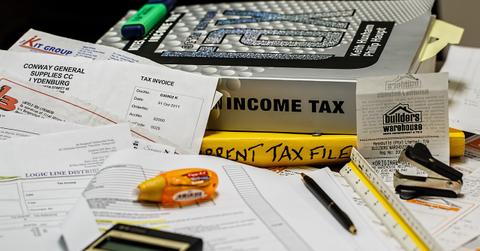What FICA Taxes Are and How They Impact Employers and Employees
Employers and employees both pay FICA taxes. Here’s everything you need to know about FICA taxes whether you're an employer, employee, or self-employed.
Sept. 24 2021, Published 10:19 a.m. ET

If you're a business owner, the IRS requires you to not only pay your business's portion of taxes, but also to withhold the appropriate taxes for your employees. One of the taxes you need to compute and withhold is a payroll tax known as FICA (Federal Insurance Contributions Act). What is the FICA tax and who pays it?
The FICA is a payroll tax that's shared equally by employers and employees to fund Social Security and Medicare programs.

What is the FICA tax?
FICA tax is a federal payroll tax. It includes a Social Security tax and a Medicare tax, both of which are designed to fund the Social Security and Medicare benefits, respectively. Usually, people receive these benefits when they reach retirement age, but you will have to pay taxes to fund the programs while you work. The FICA tax is paid in addition to other forms of taxes like federal or state income tax.
Who pays FICA Taxes?
FICA tax payments are split between an employee and the employer. Both pay an equal share of the taxes. Employers deduct the necessary payments from their workers’ paychecks and also contribute their own share to the IRS. Self-employed individuals must pay both the employee side and the employer side of the FICA tax. You can't choose to not pay FICA taxes.

FICA tax rates
The Social Security deduction is 6.2 percent of the workers’ gross salary and 6.2 percent for the employer, for a total of 12.4 percent. The Social Security tax is only levied on the first $142,800 of your earnings. This implies that if you earn $160,000, you won’t pay the 6.2 percent Social Security tax on the last $17,200 of your earnings. Your employer also doesn’t have to pay its share of Social Security tax on the last $17,200 of your earnings.
The employee part of Medicare tax is 1.45 percent with no maximum income, and the employer portion is 1.45 percent, for a total of 2.9 percent. Employers are also required to collect the Additional Medicare tax in addition to regular FICA taxes if the employee’s total annual income exceeds $200,000. The additional tax is computed at 0.9 percent of the employee’s gross income.
Is FICA taxation applicable to all income?
The FICA tax is applicable to all earned income. This includes salary, tips, bonuses, commissions, and anything else that counts as wages. Rent, some forms of royalties, capital gains, and dividends are exempt from FICA taxes.
How to pay FICA taxes if you’re self-employed
If you’re a self-employed business owner, you must pay your FICA taxes yourself as a part of your quarterly income tax calculations. Self-employed individuals must pay both sides of the FICA tax. As a result, the tax burden is 15.3 percent of all income earned.
FICA tax exemptions
However, there are several circumstances in which compensation is excluded from FICA tax. The circumstances include payments to students, general or limited partners of a partnership firm, and statutory non-employees.
